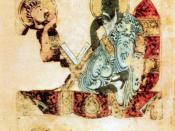The history of political thought is the history of the attempts over the centuries to answer the question: 'Why should I obey the state?'
Answers have ranged from:
The pragmatic - 'Because if I don't they will cut my head off'
To the theological - 'Because it is God's will'
From the contractual - 'Because the state and I have a deal'
To the metaphysical - 'Because the state is the actuality of the ethical idea'
Cicero was the major influence on 17th and 18th century republicanism in Britain and America, to say nothing of his role in the renaissance. Natural Law stems from Cicero as does the theory of the state as a fundamentally guardian of private property.
The basis of the state says Hegel, is the power of reason actualizing itself as will. The state is the end of the dialectical process of history, the realization of moral principles and concrete freedom.
The state is the whole of which the individual is part. Dissociated from the state, the individual has no meaning. Because the state is reason, it bestows on man whatever value he has. The state is not an accumulation of separate individuals artificially united by a conscious agreement, but a divine rationality by which and for which its members exist.
Marx thought that the idea of the Socialist state would be the briefest and the last phase of the government, whereas it promises to be another extended phase in the history of the government. In this Socialist State, the relationship between the individual and the state can be defined just as Hegel defined it: It is an end in itself and the individual is the means to that end.
Plato distinguishes two worlds, one of the essential ideas, timeless and unchanging, the other of mere appearances,


